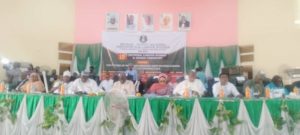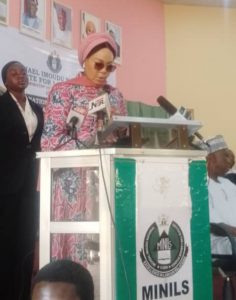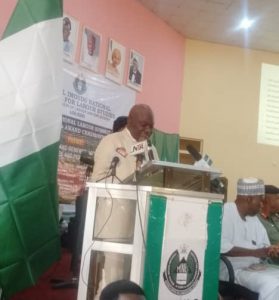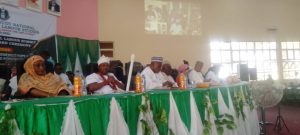Minister Advocates Dialogue, Skill Development at Labour Summit in Kwara

The Honourable Minister of State for Labour and Employment Hon . Barr. Nkeiruka Chidubem Onyejeocha has emphasized the importance of dialogue and skill development in fostering industrial harmony and national growth
Speaking during the 10th National Labour Summit and Award Ceremony organized by the Michael Imodu National Institute for Labour Studies (MINILS) in Ilorin, Kwara State the Minister commended MINILS for its dedication to advancing dialogue and promoting industrial peace, describing the institute as pivotal to the government’s efforts to realize its Renewed Hope Agenda.
“This summit aligns seamlessly with the Renewed Hope Agenda of President Bola Ahmed Tinubu’s administration, which seeks to empower our people, strengthen our economy, and create sustainable pathways for recovery and growth,” the Minister stated.
Highlighting the government’s Labour Employment Expansion Program (LEEP), the Minister noted its focus on equipping Nigerians, particularly youths, with skills for emerging industries such as digital technology, renewable energy, and clean energy.
“These programmes are not just about jobs; they are about preparing our people to thrive in a fast-changing global economy,” the Minister said.
The Minister underscored the critical role of social dialogue in implementing labour reforms and resolving industrial disputes. Citing the successful resolution of the National Minimum Wage discussions, the Minister emphasized that effective dialogue ensures all stakeholders’ voices are heard, adding that disputes must be resolved constructively.
“Industrial action, while a legitimate right, must always remain the last resort,” the Minister urged, highlighting the need for continuous engagement among trade unions, employers, and the government.
The summit was described as a crucial platform to secure stakeholder buy-in for government reforms, with the Minister calling for collective efforts to create an inclusive and sustainable labour market.
“As we explore the components of the Renewed Hope Agenda, I urge all stakeholders here to see themselves not merely as participants but as co-architects of Nigeria’s recovery,” the Minister said, adding that trust and mutual understanding are key to successful reform implementation.
The Minister expressed gratitude to MINILS for organizing the summit and encouraged participants to contribute actively to the discussions, noting that the outcomes would shape the future of labour relations in Nigeria.
The Honourable Minister of Labour and Employment, Barrister Nkeiruka Onyejeocha, unveiled the institute’s 2025 training calendar, which features academic and professional development programs, including a Bachelor’s degree in Industrial Relations and Personnel Management (in affiliation with the University of Ilorin) and a National Diploma in Industrial and Labour Relations.
Delivering his welcome address, the Director-General of MINILS, Comrade Issa Aremu, described the summit as a significant platform for evaluating the impact of President Bola Ahmed Tinubu’s reform agenda on job creation, wage improvement, and industrial harmony.
He highlighted the summit’s objectives, including fostering dialogue among stakeholders and building capacity for continuous engagement.
“Our goal is to align labour education with the Renewed Hope reforms by addressing challenges in the labour market, promoting social justice, and enhancing industrial productivity for sustainable national development,” Comrade Aremu said.
Comrade Aremu revealed that MINILS had surpassed its 2024 ministerial targets, training over 3,500 workers from the formal and informal sectors across Nigeria’s six geopolitical zones.
” This included skills acquisition programs in entrepreneurship, carpentry, tie-and-dye, cinematography, and photography.
“The institute also recorded significant gender inclusion and participation from persons living with disabilities (PLWD). Its internally generated revenue saw marginal growth, despite rising costs. “With enhanced funding, we aim to impact even more participants in 2025, targeting 5,000 beneficiaries through 53 specialized courses,” Aremu noted.
“The summit coincides with President Tinubu’s economic reforms, including the removal of fuel subsidies and the liberalization of the foreign exchange market. These measures, aimed at economic recovery and poverty reduction, have elicited mixed reactions, with critics citing inflation and wage erosion as key concerns.”
Comrade Aremu acknowledged these challenges but emphasized the administration’s commitment to transformation. “President Tinubu’s audacity of reform is commendable. The ongoing debate on these policies underscores the importance of national development,” he stated.
He also noted recent economic strides, such as the Port Harcourt Refinery’s reactivation and the emergence of the Dangote Refinery, which signal progress in Nigeria’s industrial sector.
The event also celebrated Nigeria’s rich labour history, including the launch of the “I Remember Michael Imoudu” book project, which chronicles the legacy of Nigeria’s foremost labour leader.
The Honourable Minister of Labour and Employment, Barrister Nkeiruka Onyejeocha, unveiled the institute’s 2025 training calendar, which features academic and professional development programmes, including a Bachelor’s degree in Industrial Relations and Personnel Management (in affiliation with the University of Ilorin) and a National Diploma in Industrial and Labour Relations.
. “Labour is the wealth of the nation. It is imperative to empower our 75 million-strong workforce to drive economic development,” Aremu stressed.
In her opening remarks, Mrs. O. A. Ajiboye, Chairperson of the Labour Summit Central Planning Committee and Director/Head of Social Protection Department at the Michael Imoudu National Institute for Labour Studies (MINILS), described the event as a crucial platform for fostering dialogue and collaboration in addressing the challenges of the modern labour market.
“We are gathered here not just as representatives of various sectors but as advocates for the rights and well-being of workers. Together, we will explore innovative policies, share best practices, and strengthen our collective commitment to improving labour rights and conditions for all,” she stated.
Ajiboye applauded the Director-General of MINILS, Comrade Issa Aremu, for his determination in reviving the summit, which was last held in 2013 under the tenure of Dr. John Nyt Olanrewaju.
She also commended the planning committee for their tireless efforts in ensuring the success of the event.
Ajiboye emphasized the need to rethink labour policies and practices to ensure inclusivity and equity in the evolving workplace.
“Our discussions will shape the labour landscape in Nigeria and beyond, focusing on social and economic equity and the fundamental rights of every worker. We must create environments where all workers—regardless of their sector or status—can thrive,” she said
Ajiboye stressed the importance of lifelong learning and skills development to empower the workforce to adapt to the rapidly changing job market.
She urged participants to engage in meaningful discussions that could lead to concrete actions and policies promoting decent jobs, worker protection, and sustainable growth.
“As part of the ceremony, awards will be presented to individuals and organizations who have championed labour-friendly policies and defended workers’ rights.” She said
The summit promises to set a new course for addressing labour challenges in Nigeria while reaffirming the government’s commitment to the welfare and rights of workers.



==============